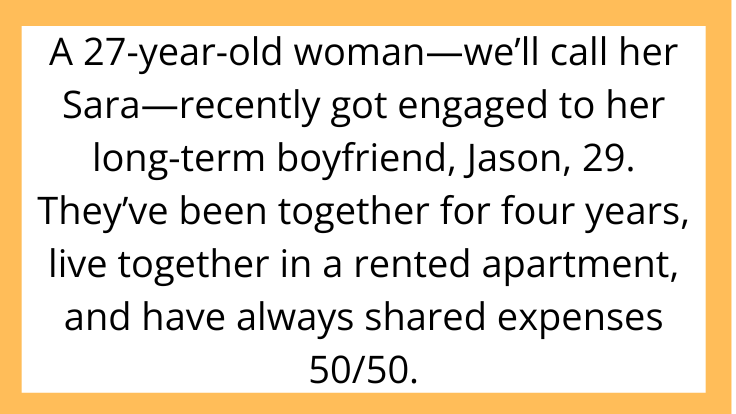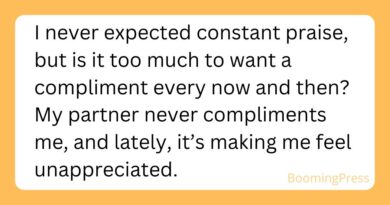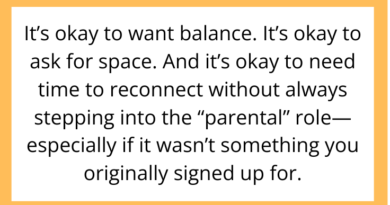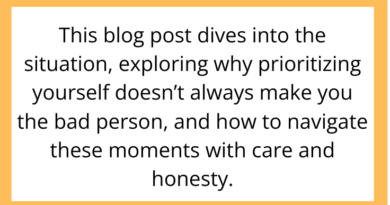AITAH for Asking My Partner to Sign a Prenup Even Though I Make Less Money?
When it comes to love and money, emotions can run high—especially when the word prenup enters the conversation. In today’s AITAH-inspired scenario, we dive into a situation that challenges traditional expectations: Is it fair to ask for financial protection, even when you’re not the higher earner?
A Love Story Meets Legal Paperwork

A 27-year-old woman—we’ll call her Sara—recently got engaged to her long-term boyfriend, Jason, 29. They’ve been together for four years, live together in a rented apartment, and have always shared expenses 50/50.
Jason is a successful software engineer pulling in six figures, while Sara works as a freelance illustrator with a modest income. They’re happy, in love, and planning their future.
But then, Sara brought up a prenup.
The twist? She wants one for her own protection.
The Reason Behind the Prenup Request

Sara explained in her r/AITAH post that although Jason earns more now, she has plans to build her own brand. She’s working on a children’s book series, licensing deals, and starting an art business. In short, she sees big things in her future.
To protect her creative work and potential earnings, she asked Jason if he’d be willing to sign a prenuptial agreement that clearly outlines ownership of individual intellectual property, future business income, and existing savings.
Jason was stunned.
He argued that prenups usually protect the higher earner—and since he makes more, it didn’t make sense. He accused Sara of “planning for divorce before marriage” and said the request felt like a betrayal.
Sara stood firm. She wasn’t trying to prepare for failure—she just wanted clarity and protection for both of them.
Now she’s asking: AITAH for asking my partner to sign a prenup even though I make less money right now?
Understanding Prenups: Not Just for Millionaires

What Is a Prenup?
A prenuptial agreement is a legal contract signed before marriage that outlines how assets, debts, and property will be handled in the event of divorce or death. It’s not just for the wealthy—it’s for anyone who wants transparency and protection.
Prenups can:
-
Define what property remains individual vs. shared.
-
Protect intellectual property or business interests.
-
Prevent future legal battles.
-
Clarify debt responsibility.
Why Sara’s Request Makes Sense
Sara isn’t asking to take anything from Jason—she’s asking to ensure what she builds remains hers. She knows that over time, creative assets can gain significant value. By signing a prenup, she’s creating a fair boundary that benefits both partners.
The Internet Weighs In: Support for Sara

Reddit’s response? Surprisingly supportive of Sara.
“You’re being smart,” one commenter said. “Protecting your future self isn’t a betrayal—it’s maturity.”
Others pointed out that Jason’s reaction showed a lack of understanding about what prenups are actually for.
“She’s not trying to take from him—she’s trying to make sure no one takes from her.”
Another user added, “It’s refreshing to see someone with less money thinking ahead. You’re not planning to fail; you’re preparing to succeed.”
Still, a few voices chimed in with caution.
“If you’re already worried about what’s ‘yours’ and ‘his,’ maybe you’re not ready for marriage.”
Money, Trust, and Power Dynamics in Relationships

Gender Norms and Role Reversals
Historically, prenups have been tools for wealthy men to protect their assets. But in modern relationships—especially as women continue to build financial independence—those dynamics are changing.
Sara’s situation flips the script: she doesn’t want Jason’s money, but she also doesn’t want to risk losing what she’s working so hard to create.
Her story challenges the idea that only the richer partner needs protection.
Trust Isn’t Just Emotional—It’s Financial Too
One of the biggest arguments against prenups is that they show a lack of trust. But is it really distrust—or is it good communication?
Sara made her intentions clear: she wants to be married, but she also wants to safeguard her creative future. That’s not selfish—it’s responsible.
Real trust means being able to talk openly about tough topics, even when it feels uncomfortable.
What Could They Do Differently?

For Sara:
-
Frame the prenup as a mutual protection tool, not a defensive move.
-
Include language that protects both partners’ current and future assets.
-
Consider a joint consultation with a neutral attorney.
For Jason:
-
Learn more about prenups from a legal and emotional perspective.
-
Reflect on why the request feels like a threat—and whether that’s rooted in misunderstanding.
-
Recognize that financial planning doesn’t mean planning for divorce—it means protecting the marriage.
Final Thoughts: AITAH or Just Future-Focused?

Sara’s situation is becoming more and more common as relationships evolve. Marriage isn’t just a romantic commitment—it’s a legal and financial one, too.
And asking for a prenup, especially when you’re not the wealthier party, isn’t selfish—it’s smart.
So, AITAH for asking your partner to sign a prenup when you make less money?



